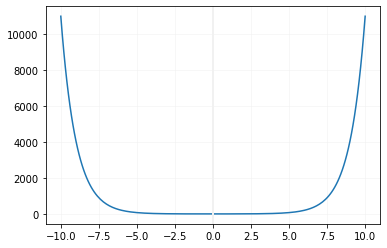cosh()
import math
print(math.cosh(-1)) # 1.5430806348152437
print(math.cosh(-1.5)) # 2.352409615243247
print(math.cosh(-5)) # 74.20994852478785
print(math.cosh(0)) # 1.0
print(math.cosh(1)) # 1.5430806348152437
print(math.cosh(1.5)) # 2.352409615243247
print(math.cosh(5)) # 74.20994852478785Inputs in degree
We can convert radian value to degree and use the sameimport math
in_degree = 60
in_redian = math.radians(in_degree)
print(math.cosh(in_redian)) # 1.600286857702386 1 radian = 57.2957914331 degree
1 degree = 0.0174533 radian
1 degree = 0.0174533 radian
Drawing graph of cosh()
We will use Matplotlib to generate graph of cosh
import matplotlib.pyplot as plt
x=[]
y=[]
i=-10
while (i<=10):
x.append(i)
y.append(math.cosh(i))
i=i+0.1
plt.plot(x,y)
plt.axvline(x=0.00,linewidth=2, color='#f1f1f1')
plt.grid(linestyle='-',
linewidth=0.5,color='#f1f1f1')
plt.show()Using cosh() with Negative Numbers
import math
print(math.cosh(-2)) # Output: 3.7621956910836314 (cosh is symmetric)Example : Finding the Difference Between `cosh()` and `cos()`
import math
angle = math.radians(60)
print(f"cos(60°) = {math.cos(angle)}") # cos(60°)
print(f"cosh(60°) = {math.cosh(angle)}") # cosh(60°)Example : Approximation Using Series Expansion
import math
def cosh_series(x, n_terms=10):
result = 0
for n in range(n_terms):
result += x**(2*n) / math.factorial(2*n)
return result
print(cosh_series(1)) # Approximation of cosh(1)
Subhendu Mohapatra
Author
🎥 Join me live on YouTubePassionate about coding and teaching, I publish practical tutorials on PHP, Python, JavaScript, SQL, and web development. My goal is to make learning simple, engaging, and project‑oriented with real examples and source code.
Subscribe to our YouTube Channel here
This article is written by plus2net.com team.
https://www.plus2net.com

 Python Video Tutorials
Python Video Tutorials